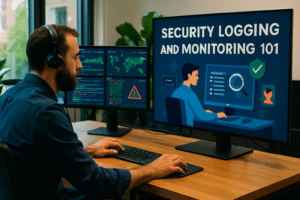
Top 5 cybersecurity skills to learn in 2025
In today’s interconnected digital world, cybersecurity is not just a requirement for tech companies but a fundamental skill for anyone engaging with technology. As we approach 2025, the landscape of cyber threats continues to evolve, demanding both technical expertise and adaptive thinking from professionals—whether you’re a student, a career changer, or someone nurturing a neurodiverse mind eager to thrive in the digital space.
The Growing Demand for Cybersecurity Skills
Cybersecurity is no longer a niche field. With data breaches, ransomware attacks, and social engineering threats making daily headlines, organizations from startups to global enterprises need people who understand how to protect digital assets. The field is rich with opportunities for beginners, women re-entering the workforce, and neurodivergent learners whose unique perspectives often lead to creative solutions.
1. Understanding Network Security
Network security forms the backbone of modern cybersecurity. It includes practices and policies designed to monitor and safeguard computer networks from misuse, unauthorized access, and attacks. Every device connected to a network becomes a potential entry point for cybercriminals, and understanding how to secure these connections is crucial.
Think of network security as the digital version of a vigilant doorman—always observing, always alert, ensuring only the right people get in.
Beginners can start by learning the basics of firewalls, VPNs, and intrusion detection systems (IDS). Hands-on experience setting up a home network and experimenting with open-source security tools can demystify complex concepts. Curiosity drives learning, and every small experiment adds to your toolkit.
2. Mastering Endpoint Security
With the rise of remote work and bring-your-own-device (BYOD) policies, endpoint security has become a critical skill for cybersecurity professionals. Every laptop, smartphone, and tablet is an endpoint—a gate that must be secured.
Effective endpoint security involves:
- Implementing antivirus and anti-malware solutions
- Configuring regular software updates and patches
- Understanding encryption techniques for data at rest
Learning to manage and secure devices across different operating systems is a skill in itself. For neurodivergent learners, the logical, checklist-driven nature of endpoint management can be especially satisfying, offering clear feedback and tangible results.
3. Developing Threat Intelligence Analysis
Cyber threats are constantly evolving. Threat intelligence analysis is the skill of gathering, interpreting, and acting upon information about potential and active cyber threats. This discipline requires a blend of investigative curiosity and technical acumen.
“Threat intelligence is not about knowing everything; it’s about knowing what matters most, right now.”
Here’s how you can start:
- Follow cybersecurity news sources and threat intelligence feeds
- Learn to use open-source intelligence (OSINT) tools
- Practice analyzing phishing emails and suspicious domains
This is also a field where diverse perspectives shine. Women and neurodivergent individuals often approach pattern recognition and problem-solving differently, leading to innovative threat detection strategies.
4. Learning Security Automation and Scripting
As cyber threats scale, manual defense is no longer feasible. Security automation—using scripts and tools to automate routine security tasks—amplifies the impact of cybersecurity teams and reduces human error.
Beginners should consider learning scripting languages like Python or Bash. These are widely used to automate:
- Log analysis
- Vulnerability scanning
- Incident response workflows
Automation doesn’t replace human expertise—it frees you to focus on creative problem-solving.
For people with a love for puzzles, scripting provides an endless playground. And for those building their confidence, starting with small scripts and gradually increasing complexity nurtures steady, rewarding growth.
5. Building Cloud Security Competencies
Cloud computing is now mainstream, but it introduces new security challenges. Cloud security skills are highly sought after as organizations migrate data and applications to platforms like AWS, Azure, and Google Cloud.
Essential cloud security concepts include:
- Identity and access management (IAM)
- Encryption in the cloud
- Configuring secure storage and monitoring
Many cloud providers offer free or low-cost learning resources. Gaining hands-on experience with cloud consoles and security policies builds confidence and demonstrates your ability to protect resources in a dynamic environment.
Cybersecurity Soft Skills: The Silent Superpower
Technical skills alone aren’t enough. Communication, empathy, and ethical judgment are as crucial as any certification. Explaining risks to non-technical colleagues, collaborating across departments, and navigating ethical dilemmas are everyday tasks for cybersecurity professionals.
Neurodiverse thinkers, women, and career changers often bring fresh insights, empathy, and collaborative skills that can transform a team’s effectiveness.
Creating Your Learning Path in Cybersecurity
Every journey begins with a single step, and cybersecurity is no exception. Here’s a framework for getting started:
- Start Small: Choose one skill—maybe network security or Python scripting—and dedicate regular time to practice.
- Seek Community: Join online forums, attend webinars, or find local meetups. The cybersecurity community is global, diverse, and often welcoming to beginners.
- Build Projects: Set up a home lab, write your first security script, or volunteer for a nonprofit’s IT needs.
- Embrace Failure: Mistakes are part of learning. Document your process, reflect, and keep going.
For women and neurodivergent learners, mentorship can be a catalyst. Seek out role models and allies who appreciate your perspective and encourage your growth.
Resources to Jumpstart Your Cybersecurity Journey
Access to quality learning materials can make all the difference. Here are some recommendations for beginners:
- Online Courses: Platforms like Coursera, Cybrary, and edX offer introductory courses in cybersecurity, often for free.
- Certifications: Consider entry-level certifications such as CompTIA Security+ or (ISC)² SSCP to validate your skills and boost your confidence.
- Practice Labs: Hands-on platforms like TryHackMe and Hack The Box make learning interactive and fun.
- Books & Blogs: Read widely—books like “The Art of Invisibility” by Kevin Mitnick or blogs from industry leaders provide context and inspiration.
“The best way to predict the future is to invent it.” — Alan Kay
Your learning journey in cybersecurity is just that—a journey. There will be moments of frustration and triumph, but every skill you build not only protects information but also opens doors to meaningful, impactful careers.
Cultivating Inclusion in Cybersecurity
The field of cybersecurity thrives on diversity. Different learning styles, perspectives, and lived experiences all contribute to stronger, more innovative solutions. Whether you’re a woman balancing career development with family, a neurodivergent thinker who sees patterns others miss, or a beginner with a passion for problem-solving, there’s a place for you in this field.
Technology needs your voice, your vision, and your vigilance.
As you explore the top cybersecurity skills for 2025, remember: the world of technology is vast and ever-changing, but your unique contributions make it safer, smarter, and more inclusive for everyone.


